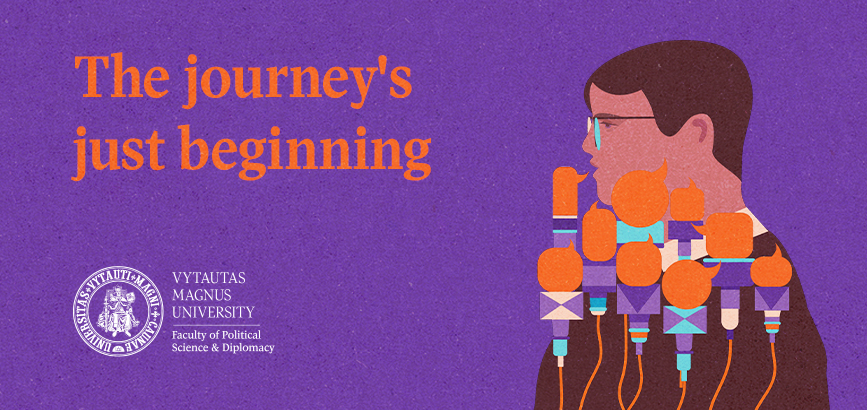Master degree studies
Diplomacy and International Relations
Area of studies: Social Sciences
Field of studies: Political Sciences
Mode of Studies: Full-time studies
Length of Programme: 2 academic years (120 ECTS)
Name of Qualification: Master of Political Science
Head of the programme: dr. Mindaugas Norkevičius
Totally new and innovative degree programme Diplomacy and International Relations was launched in September 2001. It was prepared and organized with the support of the Seton Hall University (USA), School of International Relations and Diplomacy, as well as the presence of the support of Stasys Lozoraitis Fund. Currently this programme is one of the most popular graduate study programmes at Vytautas Magnus University. Since 2012 – 2013 academic year programme is taught entirely in English.
For further information check VMU webpage.
Future Media and Journalism
Area of studies: Social Sciences
Field of studies: Journalism
Language of studies: English
Mode of studies: Full-time studies, blended learning
Length of program: 1,5 academic year (90 ECTS)
Qualification: Master of Social Sciences
Study program committee: prof. Auksė Balcytiene (Chair), prof. Kristina Juraitė, prof. Audronė Nugaraitė, assoc. Prof. Ignas Kalpokas, Rūta Beinoriūtė (alumna, Media4Change project manager), Marija Jarusevičiūtė (student).
Advisory Committee:
- Helle Sjovaag, University of Stavanger, Norway, https://sjovaaghelle.wordpress.com
- Prof. Turo Uskali, University of Jyvaskyla, Finland, https://www.jyu.fi/hytk/fi/laitokset/kivi/henkilosto/henkilosto/uskali-turo
- Hannu Nieminen, Emeritus Professor, University of Helsinki, Finland
- Epp Lauk, Professor Emerita, University of Jyvaskyla, Finland, https://www.jyu.fi/hytk/fi/laitokset/kivi/henkilosto/henkilosto/lauk-epp
- Peter Gross, Emeritus Professor, University of Tennessee, the US, https://jem.utk.edu/profile/Peter-Gross
- Prof. Josef Trappel, University of Salzburg, Austria, https://kowi.uni-salzburg.at/ma/josef-trappel
The newly updated Master program in Future Media and Journalism applies multidisciplinary approach that combines competencies and skills of journalism (ideology of professionalism in a changing news ecology), emerging media technologies and hybrid content (text, audio-visual content, automated production, VR, AI) creation with informed analysis and problem solving of evolving societal questions.
The program aims at training of engaged media professionals open to societal challenges, possessing journalistic knowledge and expertise to adequately respond to various societal needs, to critically analyze the impact of mediated communications in the public life, and to initiate innovative news services and produce multimedia products.
Future Media and Journalism program nurtures entrepreneurial attitude: program graduates will acquire qualifications and a great diversity of skills and detailed professional competences ranging from the most general related to the comprehension of societal process to the most specific and subject (journalism and media) focused. Program alumni will be qualified to work in media and communications organizations, research and training institutions, media monitoring bureaus and market research companies. The Master’s Program in Future Media and Journalism qualifies for further studies, including PhD programs.
Journalism and Media Internship course (6 ECTS, organized during Summer semester) is included into the program to provide students with an opportunity to put their knowledge and skills into practice and gain on-the-job training in the field of journalism.
More information is available on VMU website of the study programme or can be received by contacting Program Chair prof. Auksė Balčytienė or Studies Coordinator Rūta Vainauskaitė.
East European and Eurasian Studies (MIREES)
Area of studies: Social Sciences
Field of studies Political Sciences
Mode of Studies: Full-time studies
Length of Programme: 2 academic years (120 ECTS)
Name of Qualification: Master of Political Science, Joint degree
The East European and Eurasian Studies (MIREES) is a program that provides a joint diploma of the University of Bologna, Zagreb University, and Vytautas Magnus University. MIREES combines an academic approach with professional training, forging potential insightful consultants, analysts, and managers as Area Experts for international agencies, public administrations, private and public companies, and NGOs, while also offering a solid basis for further academic studies at the PhD level.
The programme is aiming at preparing professionals who are able to analyse, interpret, assess and manage problems concerning the international dimension particularly of political, economic and social phenomena in Eastern Europe. For this purpose, the program includes learning activities in economics, political science, history, cultural studies, and languages of the region which are mutually integrated to provide an in-depth preparation on the operations of political, social and economic systems in the countries of Eastern Europe and their role in the international context. Master degree programme in East European and Eurasian Studies combines different fields, expertise, methods and professional activities.
Students will spend the first year in Italy at Forlì Campus of the University of Bologna.
During the second year, students are expected to spend the first semester abroad at one of the Partner or Associated Partner Universities within MIREES Consortium as well as at other Universities (under specific agreements).
As a joint degree programme, MIREES possesses the following characteristics:
- the course structure is developed together with Universities located in different states, relevant to the MIREES’ area of specialism;
- international mobility is an integral and compulsory part of this MIREES promotes the mobility of its students, intercultural exchange, and international employability;
- upon completion of the degree requirements, students will obtain a joint diploma, officially recognized by all partner Universities.
Thanks to these characteristics, MIREES students develop expertise that they would not be able to acquire by attending any single university. As a result, MIREES graduates become well rounded area experts — who possess direct knowledge of East Europe and Eurasia, develop a unique empathy towards the region’s peculiarities, and master local languages. This grants them a strong advantage on the international labour market.












